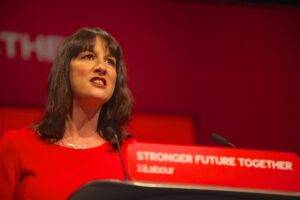<?xml encoding=”utf-8″ ?????????>
Rachel Reeves, the shadow chancellor, has conceded that it will require substantial time for a Labour government to steer Britain back on course, lambasting the Conservatives for what she described as economic vandalism spanning the past 14 years.
Speaking ahead of next week’s budget, Reeves remarked that whichever party clinches victory in the upcoming election would face the bleakest economic legacy of any incoming administration since the war, underscoring the imperative for a national endeavour to jumpstart the economy.
“I acknowledge the dire legacy awaiting us should we triumph in the election. We cannot expect to effect immediate change overnight. Growing the economy will be a gradual process, with an unwavering focus on the necessary measures for economic rejuvenation,” stated the shadow chancellor.
Drawing parallels with a memorable phrase employed by George Osborne prior to the Conservative ascension to power in 2010, Reeves remarked, “George Osborne pledged to repair the nation’s roof. Yet, the Conservatives have vandalised the economy, leaving a trail of destruction akin to breaking windows, kicking in doors, and setting the house ablaze.”
Jeremy Hunt is finalising preparations for next Wednesday’s budget, with the Treasury tempering expectations regarding the size of a projected tax relief package amidst worsening forecasts for public finances from the Office for Budget Responsibility (OBR), set to deliver its conclusive pre-budget assessment to the Treasury on Friday.
“I will not preempt the chancellor’s actions or the forecasts presented by the OBR,” Reeves stated. “However, it is evident that the budget will unveil 14 years of economic mismanagement. The subsequent government—be it Conservative or Labour—will confront the most challenging economic circumstances since the Second World War.”
Outlining Labour’s critique of the government’s economic performance since 2010, Reeves highlighted that public debt as a proportion of national output had soared to levels unseen since the 1960s. Additionally, debt interest payments had skyrocketed to their highest point since World War II, while taxes as a fraction of national output were at their peak since 1949. Furthermore, the economy had regressed to a size smaller than when Rishi Sunak assumed office as prime minister in October 2022, and the current parliamentary term was projected to be the first in which living standards—measured by real household disposable incomes—declined.
“We urgently require a nationwide initiative to reinvigorate our economy,” she asserted. “Instead, the Conservative party is embroiled in debates over fiscal headroom and the implications for Rishi Sunak’s leadership.”
Hunt is anticipated to assert in his address next week that the economy has weathered the worst and is already rebounding from the mild recession experienced in the latter half of 2023. However, the chancellor’s latitude for action is curtailed by official forecasts suggesting that he will just meet one of his fiscal mandates—ensuring that national debt diminishes five years from now—by a narrow margin.
Reeves has refrained from confirming whether Labour would endorse any tax cuts proposed by Hunt next week, opting to await the OBR’s assessment of Hunt’s measures post-budget.
She dismissed claims that Labour’s economic blueprint closely resembled that of the Conservatives, asserting, “Under Labour, people will witness a genuine transformation in our economy. They will experience something long overdue: an economy that burgeons and fosters prosperity.”
Reeves outlined Labour’s growth strategy anchored on three pillars: stability, investment, and reform.
